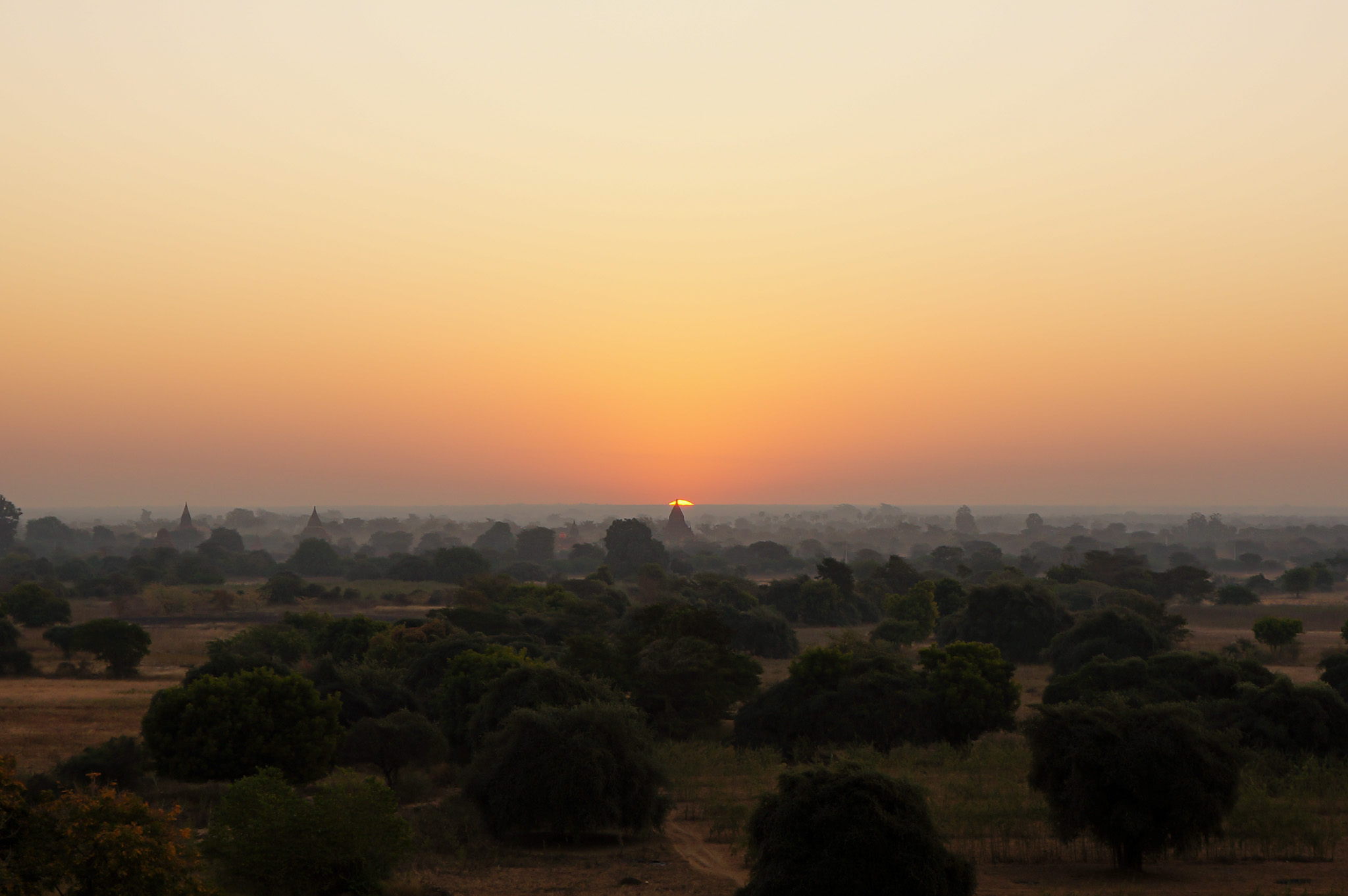Football has always played a big part of in my traveling, especially in the early days. I planned trips around matches, spent good money I often didn’t have on tickets to see teams in distant cities and countries, and it even contributed to my own desire to move half a world away. The way football can bring people together has always amazed and astounded me. It makes socioeconomic status, region, religion, race, and if you’re lucky enough, even gender, evaporate. Everyone is equal in the eyes of football.
Whether it’s a dirt floor shack in Ethiopia or a dodgy pub on my first visit to Copenhagen, I always try to find a local place to watch a match. It doesn’t even need to be an important game, just being in a place where I’m the odd one out is enough to make my football and wanna be anthropologist heart happy.
During my time in Bagan, Myanmar there was a particular match I had hoped to see. After all these years I can’t recall why it was so important that I was able to see it, it might not have even been that vital of a game, but I set out to find a bar, restaurant, or simply a working television nonetheless.
If you haven’t been to Bagan, it’s a weird and wonderful place full of contrasts. The village has been built up primarily due to the needs of tourists who usually spend a few days zooming around the nearly 2,500 temples on electric scooters. The town itself barely consists of more than two main dirt roads littered with hostels, restaurants, tourist bureaus, and laundry services. At the time I visited it was only the larger more known temples that required a donation or fee to enter, while the remaining two thousand were open to the public and free to explore at your own pace. If you have ever wanted to feel like Laura Croft or Indiana Jones, this was the place.
That morning I had arranged to go on a full day scooter tour with some other travelers, returning back with a short break to freshen up before the match was set to start. Before venturing off into the dusty backroads I stopped by a few restaurants to see if any of them might be showing the match. Without any bars present this seemed like the next best alternative. After a few misses and confused shakes of the head by the venue managers, I found a small Italian restaurant, of which there was a surprisingly high concentration of on the street, where the young son of the owner translated my question to his bewildered father. After a brief exchange in Burmese to clarify that I was in fact asking about football, the young lad confirmed they would show the match. I thanked them both and set off on my tour secure in the notion that I would be able to see my beloved Arsenal when I returned.

Football has always played a big part of in my traveling, especially in the early days. I planned trips around matches, spent good money I often didn’t have on tickets to see teams in distant cities and countries, and it even contributed to my own desire to move half a world away. The way football can bring people together has always amazed and astounded me. It makes socioeconomic status, region, religion, race, and if you’re lucky enough, even gender, evaporate. Everyone is equal in the eyes of football.
Whether it’s a dirt floor shack in Ethiopia or a dodgy pub on my first visit to Copenhagen, I always try to find a local place to watch a match. It doesn’t even need to be an important game, just being in a place where I’m the odd one out is enough to make my football and wanna be anthropologist heart happy.
During my time in Bagan, Myanmar there was a particular match I had hoped to see. After all these years I can’t recall why it was so important that I was able to see it, it might not have even been that vital of a game, but I set out to find a bar, restaurant, or simply a working television nonetheless.
If you haven’t been to Bagan, it’s a weird and wonderful place full of contrasts. The village has been built up primarily due to the needs of tourists who usually spend a few days zooming around the nearly 2,500 temples on electric scooters. The town itself barely consists of more than two main dirt roads littered with hostels, restaurants, tourist bureaus, and laundry services. At the time I visited it was only the larger more known temples that required a donation or fee to enter, while the remaining two thousand were open to the public and free to explore at your own pace. If you have ever wanted to feel like Laura Croft or Indiana Jones, this was the place.
That morning I had arranged to go on a full day scooter tour with some other travelers, returning back with a short break to freshen up before the match was set to start. Before venturing off into the dusty backroads I stopped by a few restaurants to see if any of them might be showing the match. Without any bars present this seemed like the next best alternative. After a few misses and confused shakes of the head by the venue managers, I found a small Italian restaurant, of which there was a surprisingly high concentration of on the street, where the young son of the owner translated my question to his bewildered father. After a brief exchange in Burmese to clarify that I was in fact asking about football, the young lad confirmed they would show the match. I thanked them both and set off on my tour secure in the notion that I would be able to see my beloved Arsenal when I returned.

It was shortly after kick-off when I was ushered into the backroom, the confusion on my face obvious to the other patrons who looked away from the match with puzzled glances, staring at the tall blonde westerner who had just entered the room, murmuring things to each other in Burmese. The young boy showed me an empty plastic chair at a table where there was one other local man sitting. I nodded with gratitude and sat down, still unsure of what I had gotten myself into.
I should say that the match was Arsenal versus Chelsea and despite the small attendance at this pop-up pub, there was no question as to where the loyalties of the other patrons belonged. Not only was there a language barrier, but I was the only Gunner in a small pool of royal blue threaded Chelsea supporters. It was not my first time behind enemy lines, and it certainly wouldn’t be my last.
Steering into the strangeness that befell me, I smiled at the other gentlemen and they pointed to the crest on their shirts, trying to ask if I was cheering for Chelsea. I laughed cautiously and replied no, in fact I was an Arsenal fan. Chelsea was the favorite to win the game, so rapturous laughter filled the small space as the men bantered and joked, all without a word of English.
Whether on purpose or out of sheer luck, the man they had sat me next to was the only in the room that spoke some English. As it often is in these remote corners of the world, his work in the tourism industry required basic language skills and so we made small talk and he became my translator for the evening. With every play that transpired on the small screen banter with no shared language led to laughs and joking gestures for the next hour and forty-five minutes as we toasted our frothy local beers.
I don’t remember who won the match (let’s be honest, it probably wasn’t Arsenal) but the warmth of their gaped smiles, often missing more teeth than they had, showed first-hand the unity that comes from football. We never fully understood each other, but sitting in that cramped kitchen with locals who somehow came to support a team in a country that had never been to, in a part of the world that was so different from their own, we recognized in each other the shared love of something that transcends language or religion. It was one of my first experiences with this phenomenon, but every time it has happened since it has only further solidified the idea that at its most pure level the Beautiful Game remains just that by the people who hold it the most dear.





